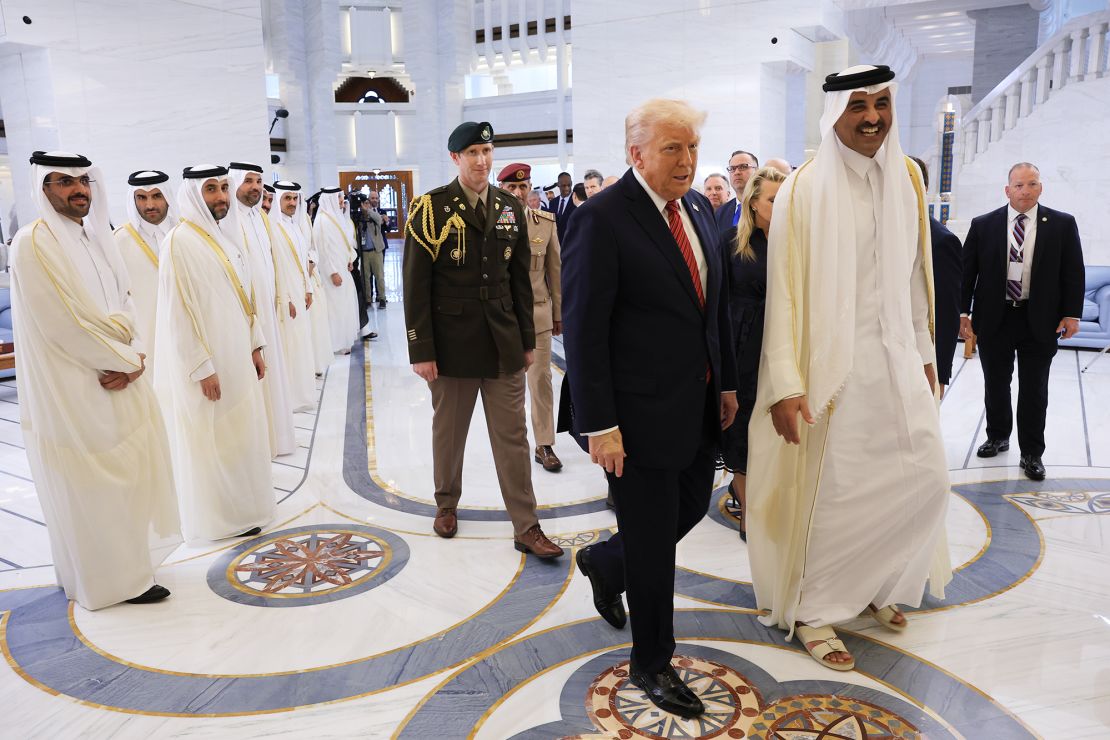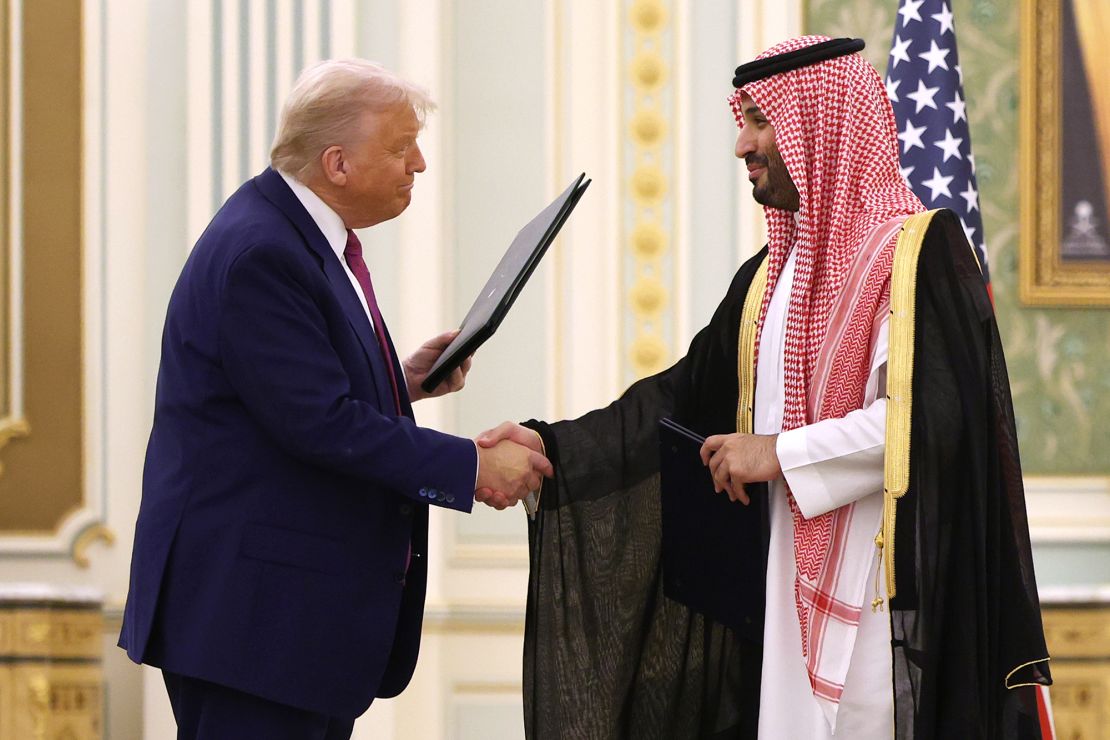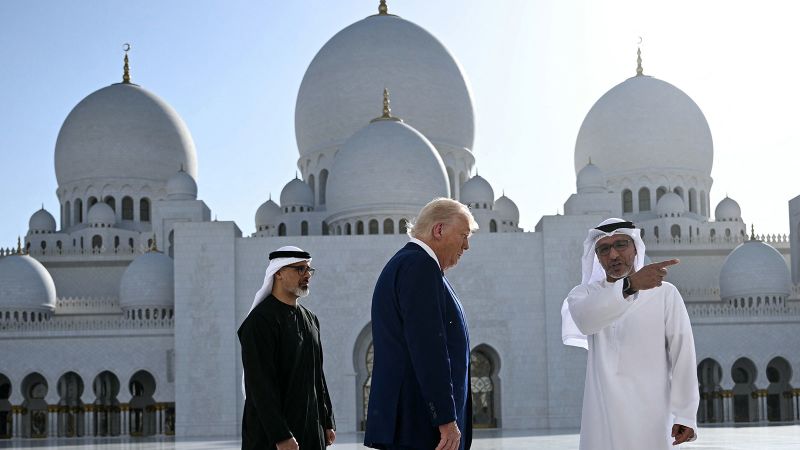Abu Dhabi
CNN
—
President Donald Trump flew back Friday from a whirlwind trip to the Middle East – investment deals in hand, a new bond with Syria forged, but still dogged by the familiar conflicts that have long hovered over the region.
His four-day trip to Saudi Arabia, Qatar, and the United Arab Emirates revealed a president with old habits – leaning into the fanfare and flattery and trappings of office – and new – a streamlined, goal-oriented agenda heavy on dealmaking and low on the chaos that engulfed his first term.
Still, some of the challenges across the globe proved too intractable for major breakthroughs this week, as Russia’s war in Ukraine, the Israel-Hamas conflict, and nuclear tensions with Iran continued to provide a backdrop of instability.
Here are key takeaways from Trump’s visit to Riyadh, Doha, and Abu Dhabi.
As he traveled from Riyadh to Doha to Abu Dhabi this week, the president fully embraced the transactional nature of his foreign policy agenda and world view.
To him, a dealmaker and peacekeeper wears one hat.
“A new generation of leaders is transcending the ancient conflicts and tired divisions of the past and forging a future where the Middle East is defined by commerce, not chaos,” Trump said during a speech in Saudi Arabia. He issued a call for “technology, not terrorism, where people of different nations, religions and creeds are building cities together – not bombing each other out of existence.”
Those blunt words brought his foreign policy objectives into sharper focus, and it became even more clear when Trump announced he was making a major change in US foreign policy and dropping sanctions against Syria “to give them a chance at greatness.”
“It’s their time to shine,” Trump said. “We’re taking them all off. Good luck Syria, show us something very special.”
There were no caveats in Trump’s remarks and none expressed a day later when he became the first US president in 25 years to hold a face-to-face meeting with a Syrian leader.
By week’s end, Secretary of State Marco Rubio sought to clarify the US position. He said the administration would start by issuing a temporary waiver of some Syria sanctions. A permanent repeal, he said, would come later in a request to Congress.
“We’re not there yet,” Rubio said. “That’s premature.”

For all the deals that Trump announced this week, one of the biggest global challenges remains elusive: getting Russian President Vladimir Putin to personally engage in peace talks on Ukraine.
“We have to meet,” Trump said Friday. “He and I will meet and I think we’ll solve it – or maybe not.”
It’s hardly the sharp tongue lashing that Trump often delivers to his foreign counterparts. Putin has repeatedly moved the goal posts on Trump who, in turn, keeps giving Putin a pass.
The ball is once again in Moscow’s court, which is a point of considerable frustration for Ukrainian President Volodymyr Zelensky. He and other European leaders called Trump as he flew back to Washington, hoping to persuade him to believe “pressure on Russia must be maintained.”
For days, Trump teased the idea of calling an audible on his trip and flying to Turkey to personally mediate the Russia-Ukraine talks. When Putin made clear he wasn’t going, Trump was left hanging.
One of the biggest questions that will soon consume the White House heading into the weekend and next week: When will Trump and Putin meet? Or when will Trump put his foot down?
The Russia issue wasn’t the only incident during Trump’s trip that emphasized the limitations on some of his most ambitious goals.
Efforts to achieve an Israel-Hamas ceasefire and hostage deal also continue to face huge obstacles – hindering Trump’s attempts to cast himself as a “peacemaker,” as he said in his January inaugural address.
Trump would have liked to unveil a major agreement between Israel and Hamas during this trip – and could have added a stop in Israel. But the conflict is at risk of escalation as Israeli Prime Minister Benjamin Netanyahu is expected to launch a more intensive phase of the war in Gaza after Trump’s trip in the region, reflecting the lack of progress made.
And Trump continues to express optimism about the prospects for a nuclear deal with Iran, but the complicated discussions don’t appear close to a solution. The Trump administration is expecting an Iranian response to a proposal discussed last weekend, possibly in the next round of talks, a source familiar with the matter told CNN. A date for those talks has not been set yet, though it is being discussed, two sources said.
On Thursday in Doha, the president indicated negotiators are “very close” to a deal and that Iran has “sort of agreed” to terms, suggesting Iran agreed not to make what he described as “nuclear dust.”

Trump repeatedly stated during the trip that Iran cannot have a nuclear weapon and warned of violent consequences if it does. Iranian President Masoud Pezeshkian responded by saying Trump was “naive for thinking that he can come to our region, threaten us, and hope that we back down against his demands” – underscoring the challenges ahead.
Typically the president’s harshest critics, several Democrats lauded Trump’s move to lift decades-old sanctions on Syria and sit down with the country’s new leader, arguing it could provide the country with an economic lifeline and help reshape the region.
That praise spanned from Leon Panetta to Rep. Jim Himes and Sen. Chris Murphy. Himes begrudgingly acknowledged he thought Trump had handled most of the Middle East trip well.
Two former Biden staffers also said privately that they thought his trip – minus Trump’s plans to accept a free plane from Qatar, which he announced ahead of time, and expanding his personal business portfolio – was a foreign policy success.
Though his 2017 trip to Saudi Arabia included first lady Melania Trump, the president traveled solo this time, freeing him up to spend extensive time with kings, princes and business leaders into the late hours.
Generally, his family has played a scaled-down role in his second administration. His eldest daughter, Ivanka Trump, who was a senior adviser during his first term and present for many of his trips abroad, has left politics. Though his son-in-law Jared Kushner was instrumental in advising the president’s team on the region ahead of the trip, Kushner did not join it.
Still, the family business loomed large – the Trump Organization, run by sons Eric Trump and Donald Trump Jr., is involved in major real estate projects in each of the countries he visited.
Additionally, Trump namechecked son Barron Trump as he touted support from a popular podcaster, Theo Von, during a visit with US troops. And on Thursday, his daughter Tiffany Trump gave birth to her first child.
“I just had a little announcement of a beautiful grandchild, a boy, Tiffany and Michael. So we’re very excited about that. I look forward to that. I probably should have left yesterday, but I couldn’t disappoint you,” Trump told his Emirati host on Friday.
Trump’s perceived domestic political enemies were on his mind during his Middle Eastern sojourn – the president took aim at Democrats, the media and celebrities throughout the trip.
The president has largely ignored the long-held norms of avoiding attacks on domestic rivals while traveling abroad, but this time his jabs were personal, frequent and striking.
Former President Joe Biden was a top target: “He never did anything about anything. He had no capability, had no ability,” he told the Gulf Cooperation Council in Riyadh.
As he held a roundtable with business leaders in Qatar, he mocked former Transportation Secretary Pete Buttigieg for his bicycle commute. The former Democratic presidential candidate reemerged on the national stage this week for a town hall in Iowa amid speculation about a 2028 presidential bid.
“He’s running the biggest air system in the world, and he takes a bicycle to work. And they say he’s going to run for president. I don’t see it. Who knows, right? But I don’t see it,” he said.
And as he visited a region known for suppressing freedom of the press – and, in one country’s case, approving the murder of a journalist – Trump called the media “enemies.”
Hours after takeoff, the president trained his ire on Taylor Swift and Bruce Springsteen in series of social media posts, calling Swift “no longer ‘HOT’” and Springsteen a “dried out ‘prune’ of a rocker.” Springsteen had lambasted Trump to a UK crowd earlier this week.

Pomp, circumstance and Cybertrucks
The president, a former reality television star, is acutely aware of the stagecraft of the presidency, particularly on international trips. And his hosts understood the assignment, providing lavish displays of fanfare at each stop to bolster their ties to Trump.
In Saudi Arabia, Crown Prince Mohammed bin Salman rolled out a royal purple carpet, along with trumpets and a 21-gun salute. In Doha, a fleet of red Tesla Cybertrucks guided the presidential motorcade, arriving at its destination to a fleet of mounted camels and Arabian horses. And in Abu Dhabi, Trump was feted with drums, children waving American and Emirati flags and women dancing while tossing their long hair back and forth, a traditional Gulf dance.
Trump’s team took note of other welcoming details, like the UAE’s Burj Khalifa lit up in an American flag motif and military fighter jet escorts at each stop.
Trump’s hosts laid it on thick and, in turn, were able to secure key agreements and new lanes of cooperation with the US.
The crown prince’s flattery of Trump and yearslong efforts to cultivate the relationship, for instance, yielded Trump’s decision to meet with Syria’s interim president.
His warm ties with his hosts this week stood in stark contrast to how the president has received some of his other counterparts who are considered closer allies to the US, including a dramatically contentious Oval Office meeting with Ukraine’s Zelensky.

